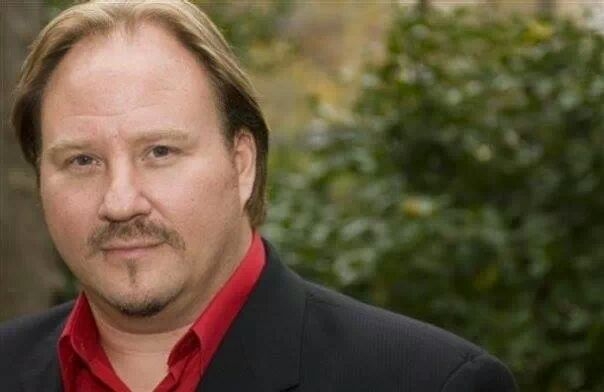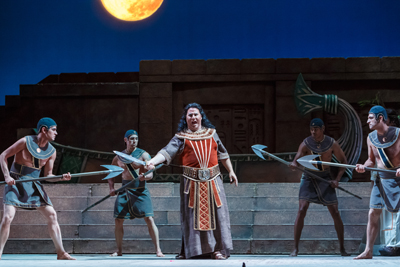Special Reports
From Trucker to Bounty Hunter to…Opera Singer?
 Carl Tanner always knew he could “make a big sound,” but he never thought much of it, until he nearly killed a guy
Carl Tanner always knew he could “make a big sound,” but he never thought much of it, until he nearly killed a guy
 Carl Tanner took violin lessons as a boy growing up in Virginia, and even through college at Shenandoah University. But, he says, his heart was never really in it. After school, he set out to become a jeweler and, to make some extra cash, got licensed as a semi-trailer truck driver. When that still kept him only barely at poverty level, he tried bounty hunting. Here he talks about his transition from professional tough guy to professional opera singer.
Carl Tanner took violin lessons as a boy growing up in Virginia, and even through college at Shenandoah University. But, he says, his heart was never really in it. After school, he set out to become a jeweler and, to make some extra cash, got licensed as a semi-trailer truck driver. When that still kept him only barely at poverty level, he tried bounty hunting. Here he talks about his transition from professional tough guy to professional opera singer.
Many people end up on a different career path than they started on, but your change from bounty hunter to opera singer—and a tenor at that!—was pretty radical.
Well, I did study violin in high school and college, although I never studied voice. I knew I could make this big sound, but I just never explored it. I did sing once or twice in front of friends and they were like, “that’s weird.” But we all mostly listened to country music.
I wanted to please my Mom, so I just figured I’d get my degree and then go do exactly what I wanted.
Which was?
I really wanted to be a jeweler. When I was in college, I’d apprenticed on Saturdays with a guy in Winchester, VA. I worked for free just to learn the craft.
After I graduated, I came back home and opened up my own booth at an antique mall for about a year. But I wasn’t making any money. So I went to drive a truck for a moving company.
A far cry from being a jeweler!
Maybe, but I loved it. I had no boss. I got to see new places, people’s homes. But I was still only making about $450 or $500 a week, which wasn’t enough.
A friend of mine told me about a former green beret he knew who was a bounty hunter and was looking to hire someone. I had heard about bounty hunters, but I wasn’t really sure what they were, so I asked the guy what he did.
What was his response?
He told me “we pick up criminals.” He said I’d have to get trained to use a gun. I don’t believe in guns—I was probably the only redneck kid in Virginia who didn’t—but I had to learn anyway.
So you walked around with a gun?
Actually, I carried three. One was a sawed-off shotgun, but it was never loaded. I used it just for intimidation purposes. When I sang at the White House, George Bush called me the “Barney Fife of Bounty Hunters.”
 So how did you go from being a jeweler, truck driver, and bounty hunter to being an opera singer?
So how did you go from being a jeweler, truck driver, and bounty hunter to being an opera singer?
It was pretty simple. I got shot at when I chased a guy, and then he jumped out a window to his death, committing suicide. I felt really bad about that. I was getting weary of bounty hunting anyway, because it was getting increasingly dangerous. As long as you do it, your number’s going to come up.
Around that same time I was driving my truck and I was singing along with Tosca on the radio—I think it was Domingo at the Met. And this lady pulls up beside me and says, something like, “you know you’re just wasting your calling by driving your truck.”
Seriously?
Seriously. We were stuck in traffic, and my window was down. Then she just drove off—disappeared. That same day, when I got home, my father said pretty much the same thing. Maybe we were all listening to the same broadcast, because he said I sounded “just like that Plahseebo Domino guy.”
You mentioned earlier that your truck-driver boss was also on your case to pursue voice.
Yeah. It all happened about the same time. People kept telling me that I had this gift, and he just forced the issue by telling me he was going to fire me anyway. So I bought a bus ticket to New York for $27. I didn’t think about it. I found a youth hostel between Eighth Avenue and Broadway on 38th Street. But I had only brought $100 with me, so I ended up on the floor of a friend’s place. I got a job as a telemarketer for a moving company.
How did you end up at Asti’s? [Asti’s was a legendary restaurant on 12th Street where many singing waiters got their start in the Big Time.]
I was wandering around the Village one day and walked by this restaurant that was playing opera. I mean, how often do you hear opera coming out of a restaurant in the Village? So I went in to check it out. The place was dead—maybe four people. One thing led to another, and I ended up singing for the owner because he said he might hire me to sing on weekends, for $15 a night. I sang “E lucevan le stelle” from Tosca and the place just froze. When I finished, the guy says, “That was amazing. Where have you been and where are you from? There’s a place called Asti’s on East 12th St.” I was [working] there by the following weekend.
So you must have had some training prior to this, no?
Yeah, I had apprenticed at Wolf Trap the summer I was 18. But that was about it. This was like ten years later.
OK, then, back to the magic moment.
When I sang at Asti’s, this guy races up to me after and says [in a British accent], “Do you know who I am?” and hands me his card. I say no and he tells me to look at the card. It’s Richard Gaddes, which I immediately pronounce “Gades,” so he says, “call me Richard. I am from the Santa Fe opera—we’d like you to come and do an audition for our apprentice program.”
I only knew the two Tosca arias and O Holy Night. When I handed the pianist the music for O Holy Night, she laughed.
I bet she stopped when she heard you sing it.
Yes, and John Crosby [founding general director of Santa Fe Opera at the time] said, “The arias were OK, but you really have something there with the Christmas song, and I don’t like Christmas music. Come out to Santa Fe this summer.”
How did you prepare for the apprenticeship?
I hadn’t sung in ages, I didn’t really remember how to read music. I wasn’t a good musician—I played the violin for about 10 years, but it may as well have been 10 minutes. I was really terrible.
Then I remembered there was a voice coach, Gerald Brown, from Shenandoah. He was based in New York and he only charged $25 an hour. He had to teach me everything about music, all over again, from scratch. But he was very encouraging.
What was Santa Fe like for you?
As soon as I got there, I knew I was not the same as everyone. A lot of people are raised on classical music and plan for a career in it. But I wasn’t. I was raised on country music. Plus, I was older than everybody else. I was almost 30 by then.
How did that make you feel?
Terrible. I thought, “Oh my God what am I doing here? This is ridiculous.” But I knew that what I lacked I made up for in other ways. I knew I could make a great sound, but I didn’t know what I was doing. The others had a knowledge of how to use their voices, but some of them didn’t have really great voices.
I was determined to catch up. To do something really well, you have to really, really work at it. And I did. That summer I got an agent and started getting real gigs. I was ready.





 FEATURED JOBS
FEATURED JOBS

 RENT A PHOTO
RENT A PHOTO


